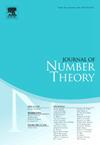最大弹性二次场
IF 0.6
3区 数学
Q3 MATHEMATICS
引用次数: 0
摘要
回想一下,对于每个非零非单元都因数化为不可还原单元的域 R,R 的弹性定义如下{sr:π1⋯πr=ρ1⋯ρs,所有 πi,ρj 都不可还原}。如果 K 的整数环是 UFD,且{1,32,2,52,3,...}∪{∞}中的每个元素在 K 中作为无穷多阶的弹性出现,我们就称一个二次域 K 为最大弹性域。假设广义黎曼假说成立,我们证明 K=Q(2) 具有普遍弹性,并为最大弹性二次域的猜想特征提供证据。本文章由计算机程序翻译,如有差异,请以英文原文为准。
Maximally elastic quadratic fields
Recall that for a domain R where every nonzero nonunit factors into irreducibles, the elasticity of R is defined as We call a quadratic field K maximally elastic if the ring of integers of K is a UFD and each element of appears as an elasticity of infinitely many orders inside K. This corresponds to the orders in K exhibiting, to the extent possible for a quadratic field, maximal variation in terms of the failure of unique factorization. Assuming the Generalized Riemann Hypothesis, we prove that is universally elastic, and we provide evidence for a conjectured characterization of maximally elastic quadratic fields.
求助全文
通过发布文献求助,成功后即可免费获取论文全文。
去求助
来源期刊

Journal of Number Theory
数学-数学
CiteScore
1.30
自引率
14.30%
发文量
122
审稿时长
16 weeks
期刊介绍:
The Journal of Number Theory (JNT) features selected research articles that represent the broad spectrum of interest in contemporary number theory and allied areas. A valuable resource for mathematicians, the journal provides an international forum for the publication of original research in this field.
The Journal of Number Theory is encouraging submissions of quality, long articles where most or all of the technical details are included. The journal now considers and welcomes also papers in Computational Number Theory.
Starting in May 2019, JNT will have a new format with 3 sections:
JNT Prime targets (possibly very long with complete proofs) high impact papers. Articles published in this section will be granted 1 year promotional open access.
JNT General Section is for shorter papers. We particularly encourage submission from junior researchers. Every attempt will be made to expedite the review process for such submissions.
Computational JNT . This section aims to provide a forum to disseminate contributions which make significant use of computer calculations to derive novel number theoretic results. There will be an online repository where supplementary codes and data can be stored.
 求助内容:
求助内容: 应助结果提醒方式:
应助结果提醒方式:


